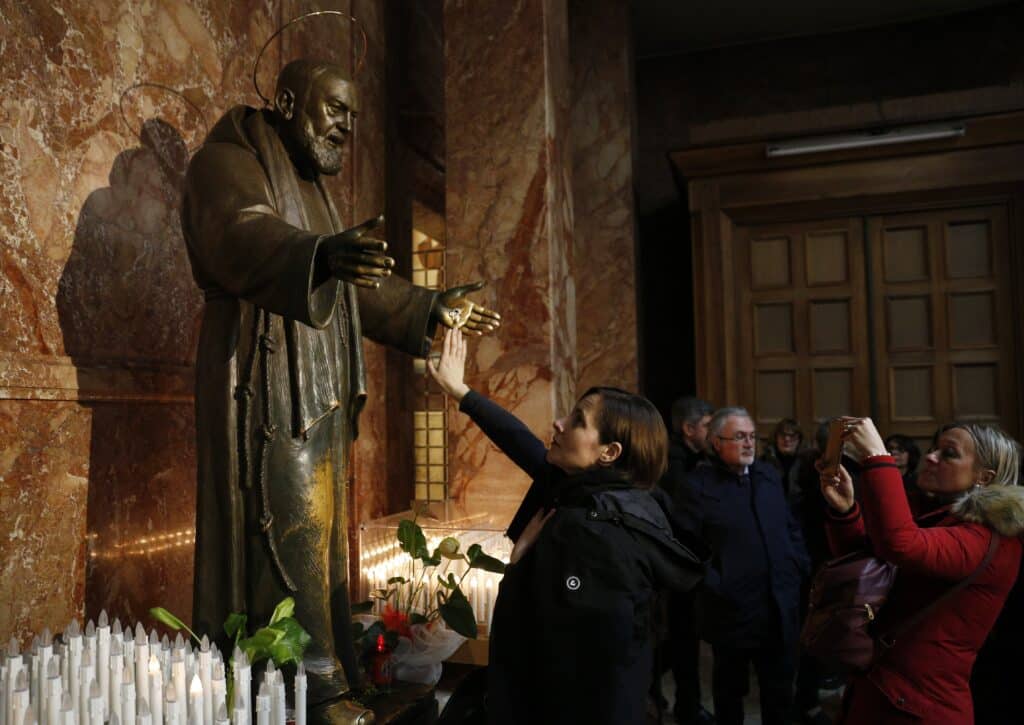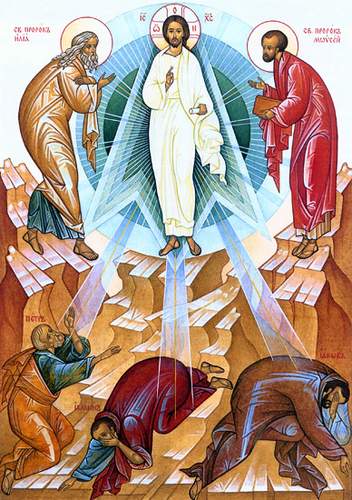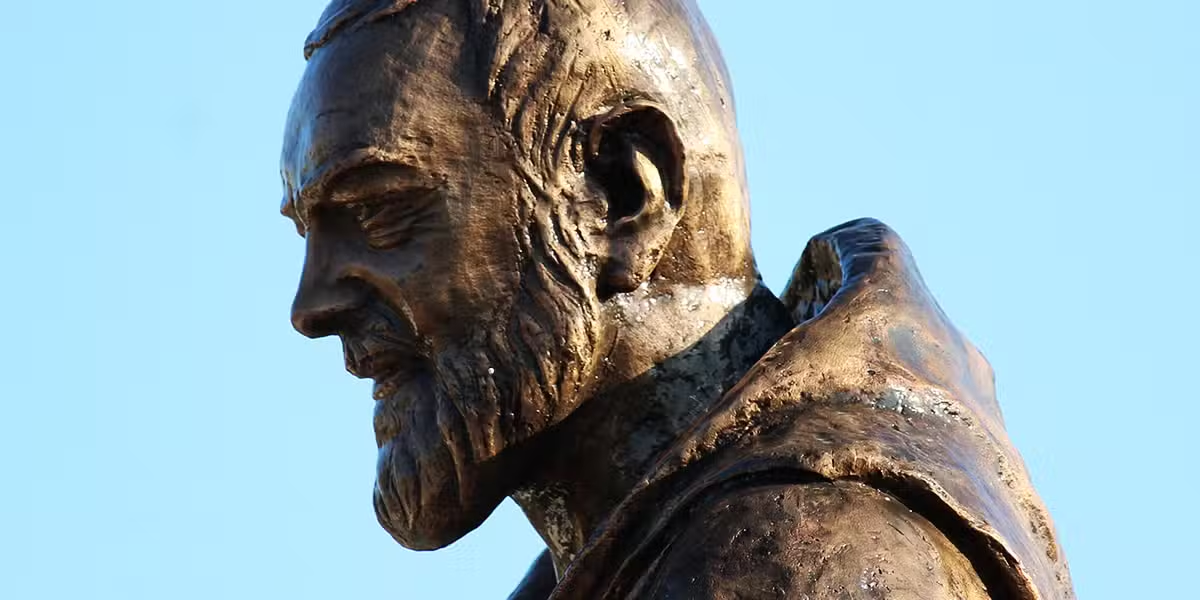My visit to this popular saint’s tomb deepened my appreciation for his life.
A few years ago, 14 pilgrims and I visited the tomb of Saint Padre Pio in San Giovanni Rotondo in southern Italy. In this small town on a barren mountainside, Padre Pio in 1917 began an assignment at the Capuchin Friary and Church of Our Lady of Grace. There he remained until his death on September 23, 1968.
During those decades, many dramatic things happened at that Franciscan friary and church. On September 20, 1918, Padre Pio received the stigmata while making his thanksgiving after Mass in front of a crucifix in the friary choir loft overlooking the inside of the church.
As the story of this event spread, thousands of people began arriving by busload to attend his Masses or to confess their sins to this devout Capuchin friar known to have the gift of “reading souls.” Reports of remarkable healings performed by Padre Pio also began to circulate throughout the region and beyond, and continued to do so throughout the saint’s life—and after his death.
Padre Pio’s Shrine Expands
When our pilgrimage bus rolled into this greatly expanded town, we encountered a very different Church of Our Lady of Grace (Santa Maria delle Grazie) than Padre Pio knew. For one thing, our group did not see the small façade of the simple church, with which Padre Pio was very familiar in his early years there. Instead, we saw a new and greatly enlarged façade and structure that now houses both the “old church” that Padre Pio knew and a much larger “new church” built to accommodate the ever-growing number of pilgrims coming to attend Padre Pio’s Masses in his later years.
And now, a huge new Church of Saint Pio stands behind and a bit below the enlarged structure. It is able to hold 7,000 people within its walls. And the outdoor plaza alongside it can hold thousands more.
House for the Relief of Suffering
To the front and right of the enlarged structure (containing the two churches) is a huge five-story hospital gleaming brightly in the sun. This hospital, known as the House for the Relief of Suffering, has 350 beds and was a dream of Padre Pio from early on. In 1940, Padre Pio and two doctors came up with the idea of constructing such a hospital. Work began in 1947, and the hospital was already in operation in 1954. It continues to thrive as a highly respected medical facility.
This hospital, more than anything else, convinces many people of the spiritual balance of Padre Pio. Even though he is credited with performing more than a thousand miraculous cures over the years, he remained committed to building this hospital. This House for the Relief of Suffering suggests to the world that God’s everyday way of bringing about healing is through the skills of doctors and nurses, as well as through the support and care of community, family and friends.
Big Changes at Padre Pio’s Tomb
A central feature of Saint Padre Pio’s shrine today is, of course, his tomb. When we visited this tomb in the crypt of the Church of Our Lady of Grace, we found it often surrounded by groups of pilgrims. They were coming there to pray for personal favors or for the healing of loved ones. But not long after our visit, dramatic changes began to take place at Padre Pio’s tomb.
Archbishop Domenico D’Ambrosio, papal delegate for the shrine of Padre Pio, announced that the saint’s body would be exhumed, studied and later displayed for public veneration. According to Catholic News Service, the archbishop revealed that “he and the Capuchin friars of Padre Pio’s community had decided it was important to verify the condition of the saint’s body and find a way to ensure its preservation.” The archbishop also explained that the Capuchins, with Vatican approval, “have authorized the exposition and public veneration of the saint’s body for several months beginning in mid-April.”
According to Catholic News Service, Archbishop D’Ambrosio presided over the exhumation of the body of Padre Pio in a service that began at 10 p.m. and ended more than two hours later. A statement, released the next day, said the body of the saint was in “fair condition.” The archbishop told reporters that the saint’s hands were well preserved and “looked like they had just had a manicure.” He also said that the saint’s feet were clearly visible; the Capuchins traditionally are buried barefoot.
The Catholic News Service story also noted, “The Capuchins of San Giovanni Rotondo, who were represented at the exhumation, said the skull and parts of the upper body showed serious signs of decay,” which was blamed on humidity in the coffin.

A woman touches a statue of St. Padre Pio in the Church of Santa Maria delle Grazie at the Shrine of St. Pio of Pietrelcina in San Giovanni Rotondo, Italy. (CNS photo/Paul Haring)
Padre Pio’s remains were then moved to a room set up in the adjacent Capuchin convent where he lived for many years. Technicians worked to preserve and reconstruct the corpse of Padre Pio. The archbishop and the Capuchins hired the London-based Gems Studio, which makes lifelike sculpted figures for museums, to create a silicone mask—including a short mustache and ample beard—for the saint’s body.
Cardinal Saraiva Martins, prefect for the Congregation for Saints’ Causes, celebrated Mass at San Giovanni Rotondo before officially unveiling the new, crystal tomb in which Padre Pio has been reburied. Since then the exhumed body of Padre Pio has lain in a glass sepulchre in the crypt of the saint’s shrine—the same crypt in which his remains had been kept for 40 years. His body will remain there on display for public viewing at least until late September, but perhaps for as long as a year before the crystal will be covered.
A Special Crucifix and Other Features
Elsewhere in the shrine millions of visitors come each year and view the many items on exhibit. Pilgrims can contemplate the historic crucifix before which Padre Pio was praying when he received the stigmata on his hands, feet and side. Another significant exhibit for the visitors’ interest is the friary room or cell, now enclosed by glass, where Padre Pio lived, slept and prayed for many years.
There are many other interesting items and memorabilia laid out for exhibit in the corridors of the shrine, such as photos of Padre Pio, his parents and others. Visitors can also see, for instance, an old confessional where, hour after hour, Padre Pio heard confessions and gave spiritual advice to the thousands who sought it.
After our bus pulled away from Padre Pio’s shrine and the town of San Giovanni Rotondo, I began to ask myself: What are visitors supposed to learn from the life of a saint—indeed, from this “unusual” mystic, whom the whole world knows as Padre Pio?
Of course, we could say that Padre Pio’s main focus was no different from that of any thoughtful Christian—namely, a focus on the great love that God reveals to us through the passion and death of Jesus Christ. We are very familiar with the central formula of our faith proclaimed at the Eucharist: “Lord, by your cross and resurrection you have set us free. You are the savior of the world.”
Among the people of God, however, we all know there are different levels of sensitivity to God’s love and goodness. Saints like Padre Pio and Saint Francis of Assisi might appreciate and respond to God’s gift of overflowing love in very dramatic ways.
On the other hand, other people may respond to the mystery of God’s love in ways that seem more ordinary. Yet, even these more ordinary people may encounter powerful moments of blessing (a wonderful prayer experience) and of crisis (serious illness or challenge). These moments may be very intense and dramatic—and they can bring us very close to the loving presence of God. And our faith tells us we are never far away from the love of God.
The Stigmata
Saint Francis of Assisi (1181-1226) is widely considered the first Christian stigmatic. Franciscans certainly turn to this saint to help them understand what meaning the passion of Christ had in Saint Francis’ life and that of his followers.
Saint Bonaventure (1221-1274), the renowned Franciscan theologian, mystic and spiritual writer, is a great help in this regard. When Saint Bonaventure, in hisLife of Saint Francis, describes the scene on Mount La Verna where Francis received the stigmata, he does so in the context of God’s overflowing love for Francis. Bonaventure relates that Francis, two years before his death, went to Mount La Verna around the Feast of the Exaltation of the Cross (September 14). He went there to ponder the mystery of Christ’s passion. Bonaventure frequently uses images of fire and flames to describe the intensity of both Francis’ love and that of the crucified Christ, who communicates his love to Francis in a fiery manner.
Bonaventure writes that, as Saint Francis pondered Christ’s sufferings on Mount La Verna, his “unquenchable fire of love for the Good Jesus [was] fanned into such a blaze of flames that many waters could not quench so powerful a love” (see Song of Songs 8:6-7).
It was a short time after this that Bonaventure describes the scene of Francis receiving the stigmata: “Francis saw a Seraph [angel] with six fiery and shining wings descend from the heights of heaven. And when the Seraph [came near] the man of God, there appeared between [the Seraph’s] wings the figure of a man crucified, with his hands and feet extended [as if] fastened to a cross….
“When Francis saw this, he was overwhelmed with a mixture of joy and sorrow. Francis felt joy because of the gracious way Christ looked upon him, but the fact that Jesus was fastened to a cross pierced his soul with a sword of compassionate sorrow” (see Luke 2:35).
It was at this moment that Francis received the stigmata— the five wounds of Christ. The “fiery and shining wings” of the Seraph, as depicted by Bonaventure, suggest the flaming intensity of God’s love, which the crucified Christ was pouring forth from his loving heart into Francis.
Saint Padre Pio (1887-1968), closer to our times, is the most universally known Franciscan—and Christian, for that matter—to bear the marks of Christ.
Though ordinary people by the thousands sensed the holiness of this Capuchin mystic and considered him a living saint, Padre Pio was nevertheless much maligned during a large part of this life. He was often despised and mistrusted by envious priests, by some members of his own Capuchin community and by many top officials of the Roman Catholic Church. Many wrote him off as a self-seeking fraud. As a result, Padre Pio suffered greatly, yet complained little.
In the end, he was vindicated and exonerated by history and by the canonization process, which ultimately declared him a saint. Saint Padre Pio’s canonization ceremony in 2002 drew 300,000 people to Vatican City, filling Saint Peter’s Square and nearby streets.
Padre Pio’s personality and life experience in many ways differ from that of Francis. But like Francis—especially as portrayed in the writings of Bonaventure—the spiritual writings of Padre Pio are often filled with images and expressions of fire and flames and all-consuming love. These images tie Padre Pio intimately to the spiritual tradition of Saint Francis and Saint Bonaventure. Consider these passages from letters that Padre Pio wrote to his spiritual directors:
“I feel my heart and my inmost being completely absorbed by the mounting flames of an immense fire….While my soul experiences an atrocious agony caused by the flames that I have described, it is filled at the same time by an exceeding sweetness which calls forth immense love of God….
“Sometimes at the altar my whole being burns in an indescribable manner. My face, in particular, seems to go on fire.” Padre Pio speaks further of “this ever active volcano, which burns me up and which Jesus has placed in this very small heart. It can all be summed up as follows: I am consumed by love for God and love for my neighbor.”
Timeline of Padre Pio
1887: Francesco Forgione is born in Pietrelcina in southern Italy.
1903: Francesco enters Capuchin novitiate in Morcone, Italy, and takes the name of Brother Pio.
1910: Brother Pio is ordained a priest in the Cathedral of Benevento near Pietrelcina.
1916-17: Padre Pio goes to Naples for national service but is sent back to the friars because of poor health. After some months of rest, he returns to Naples only to be discharged from the army because of worsening health problems.
1917: Padre Pio begins his long stay at the Capuchin friary at San Giovanni Rotondo.
1918: Padre Pio receives the stigmata, visible signs of Christ’s passion. He has them until his death.
1968: At age 81, Padre Pio dies in his room at San Giovanni Rotondo at 2:30 a.m. His last words are, “Jesus, Mary! Jesus, Mary!” Over 100,000 people attend Padre Pio’s funeral (September 26) in San Giovanni Rotondo.
1990: Padre Pio is beatified by Pope John Paul II.
2002: Padre Pio is canonized by Pope John Paul II.
franciscanmedia.org







